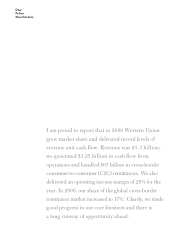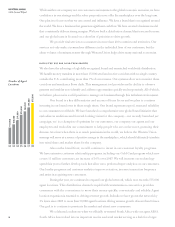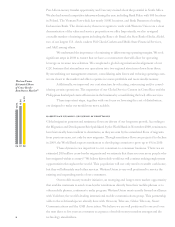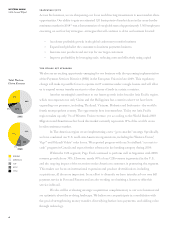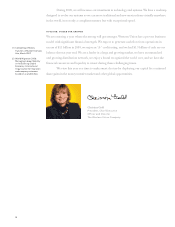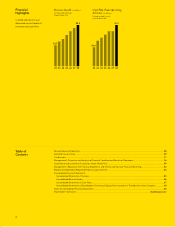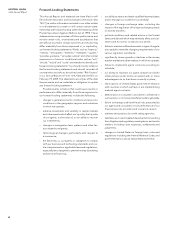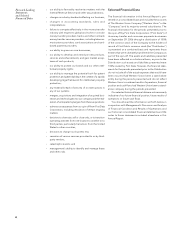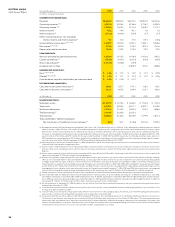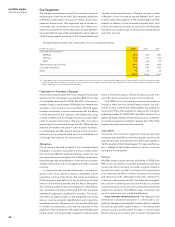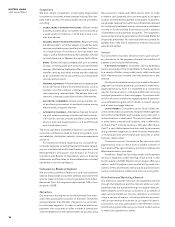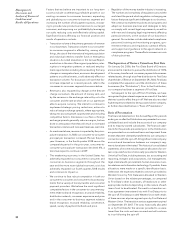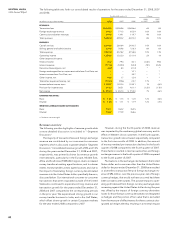Western Union 2008 Annual Report Download - page 13
Download and view the complete annual report
Please find page 13 of the 2008 Western Union annual report below. You can navigate through the pages in the report by either clicking on the pages listed below, or by using the keyword search tool below to find specific information within the annual report.11
The Western Union Business
Our revenue is principally generated by money transfer
and payment transactions. We primarily derive our rev-
enue from two sources. Most of our revenue comes from
fees that consumers pay when they send money. In certain
consumer money transfer transactions involving different
send and payment currencies, we generate revenue based
on the difference between the exchange rate set by us to
the consumer and the rate at which we or our agents are
able to acquire currency.
In our consumer-to-consumer segment we provide
our third-party agents with our multi-currency, real-time
money transfer processing systems used to originate and
pay money transfers. Our agents provide the physical
infrastructure and staff required to complete the trans-
fers. We generally pay our agents a commission based
on a percentage of revenue. The commission is shared
between the agent that initiated the transaction, the “send
agent,” and the agent that paid the transaction, the “receive
agent.” For most agents, the costs of providing the physi-
cal infrastructure and staff are typically covered by the
agent’s primary business (e.g., postal services, banking,
check cashing, travel and retail businesses), making the
economics of being a Western Union agent attractive to
our agents. Western Union’s global reach and loyal con-
sumer base allow us to attract agents we believe to be of
high quality.
In our consumer-to-business segment we process
electronic and cash payments to a variety of organiza-
tions that receive consumer payments, including utilities,
auto finance companies, mortgage servicers, financial
service providers and governmental agencies, which we
sometimes refer to as “billers.” We process electronic pay-
ments using the consumer’s credit card, debit card or bank
account. We process cash payments much like we process
consumer-to-consumer transactions. We believe our billers
benefit from their relationship with Western Union as their
relationship with us provides them with real-time or near
real-time posting of their customer payments, reduced
expenses that the biller would have otherwise incurred
for cash and check handling, and in certain circumstances
another source of income.
Our Business
Overview
Western Union is a leader in global money transfer, pro-
viding people with fast, reliable and convenient ways to
send money around the world. The Western Union® brand
is globally recognized. Our services are available through
a network of over 375,000 agent locations in more than
200 countries and territories. Each location in our agent
network is capable of providing one or more of our ser-
vices. As of December 31, 2008, approximately 75% of
our locations had experienced money transfer activity in
the prior 12 months. Our consumer-to-consumer money
transfer service enables people to send money around
the world in minutes. Our consumer-to-business service
provides consumers with flexible and convenient options
for making one-time or recurring bill payments.
We believe that brand strength, size and reach of our
global network, and convenience and reliability for our
consumers have been key to the growth of our business.
As we continue to meet the needs of our consumers for
fast, reliable and convenient money transfer services, we
are also working to enhance our services and provide
our consumers with access to an expanding portfolio of
payment and other financial services.
History and Development
Western Union was incorporated in Delaware as a wholly
owned subsidiary of First Data Corporation, or “First
Data,” on February 17, 2006, in anticipation of the spin-
off described in “The Separation of Western Union from
First Data.”
The Western Union Company has roots back to 1851.
Western Union stock was first traded on the New York
Stock Exchange in 1865. In 1884, the original Western
Union was one of the 11 companies included on the first
Dow Jones average. Western Union has a long history
of providing innovative services, including creating the
universal stock ticker and launching the first United States
commercial communications satellite service. Western
Union introduced our consumer-to-consumer money
transfer service in 1871. Western Union began offering
consumer-to-business payment services in 1989 when
we introduced Western Union Quick Collect® or “Quick
Collect,” providing consumers in the United States with
the ability to conveniently pay bills in cash through our
agent network.
Over the past decade, we have become a leader in the
development of a global remittance market. Today, we
offer money transfer services under the Western Union®,
Orlandi Valuta® and VigoSM brands in over 200 countries
and territories, and various bill payment services, primarily
in the United States, under several brands like Speedpay®,
Equity Accelerator®, Just in Time EFT®, Western Union
Quick Collect and Western Union Convenience Pay®.
11


